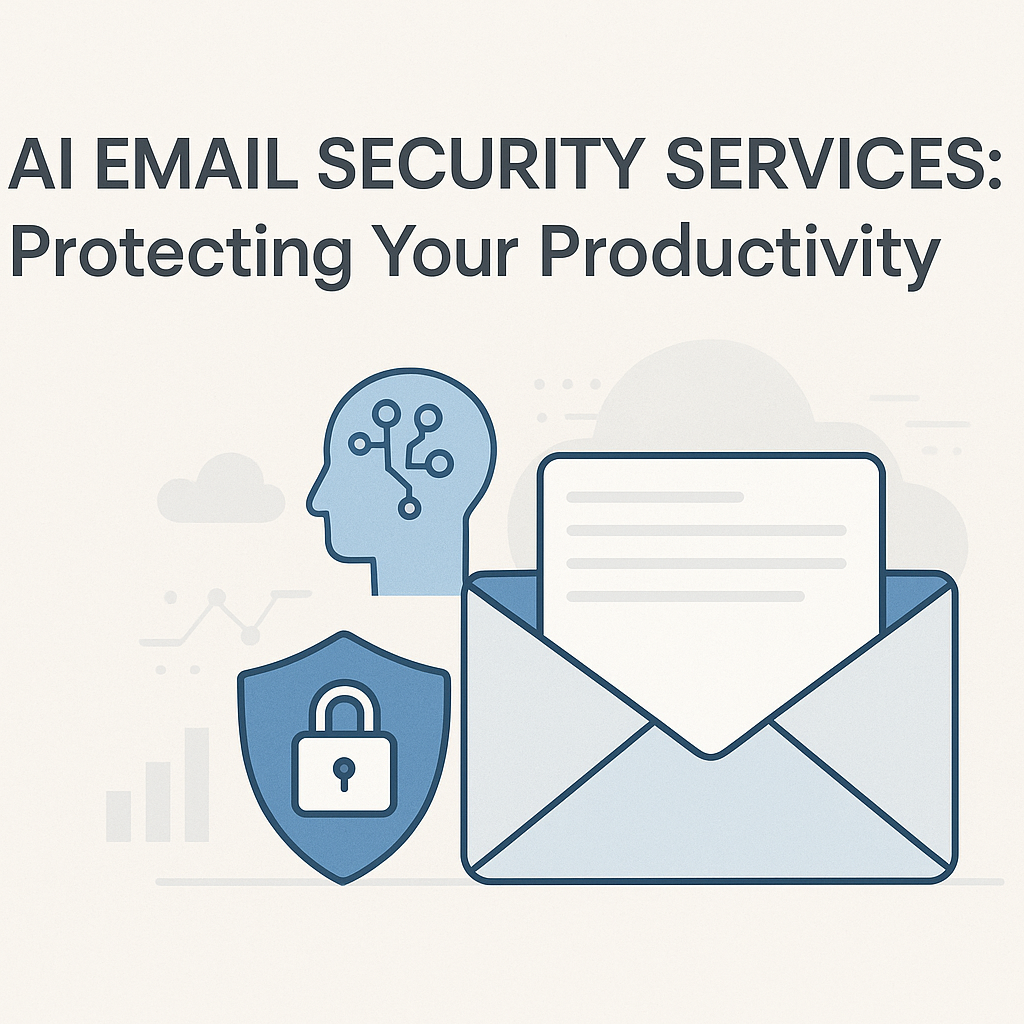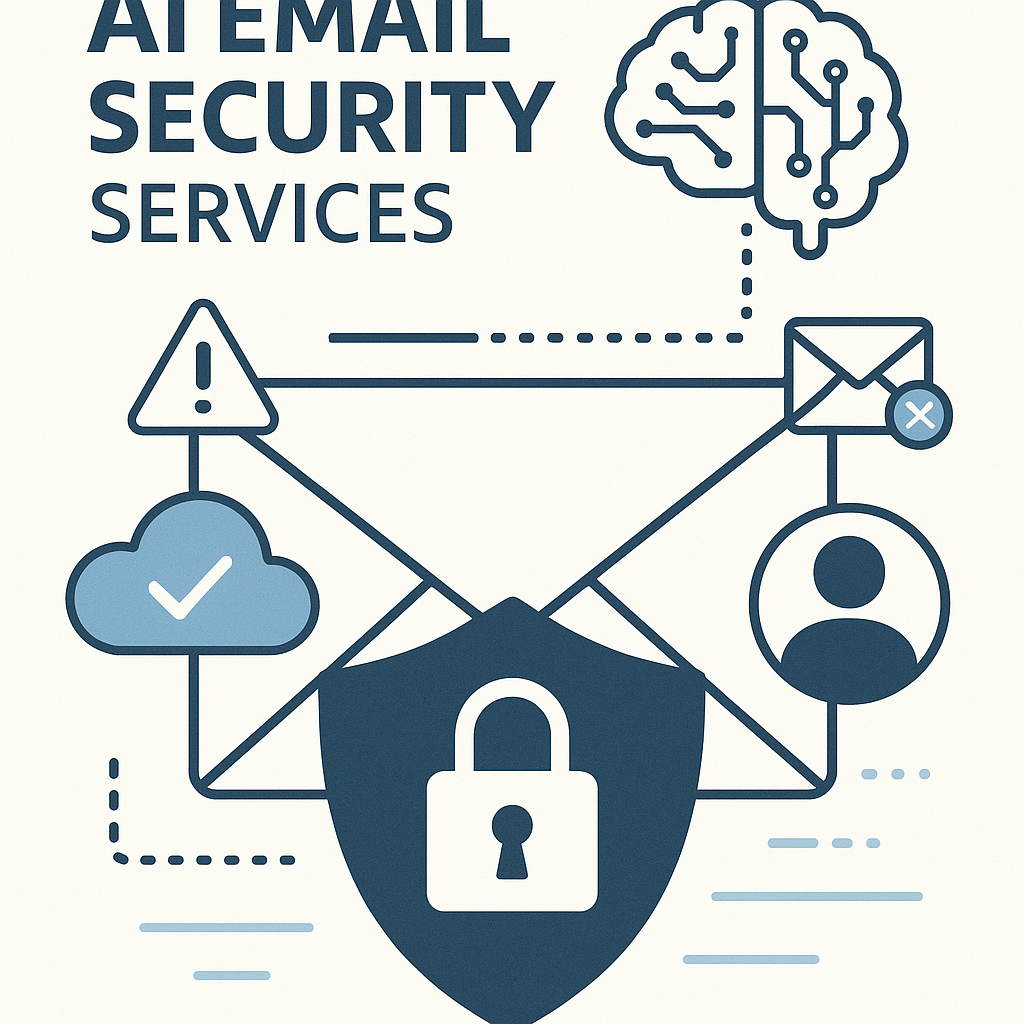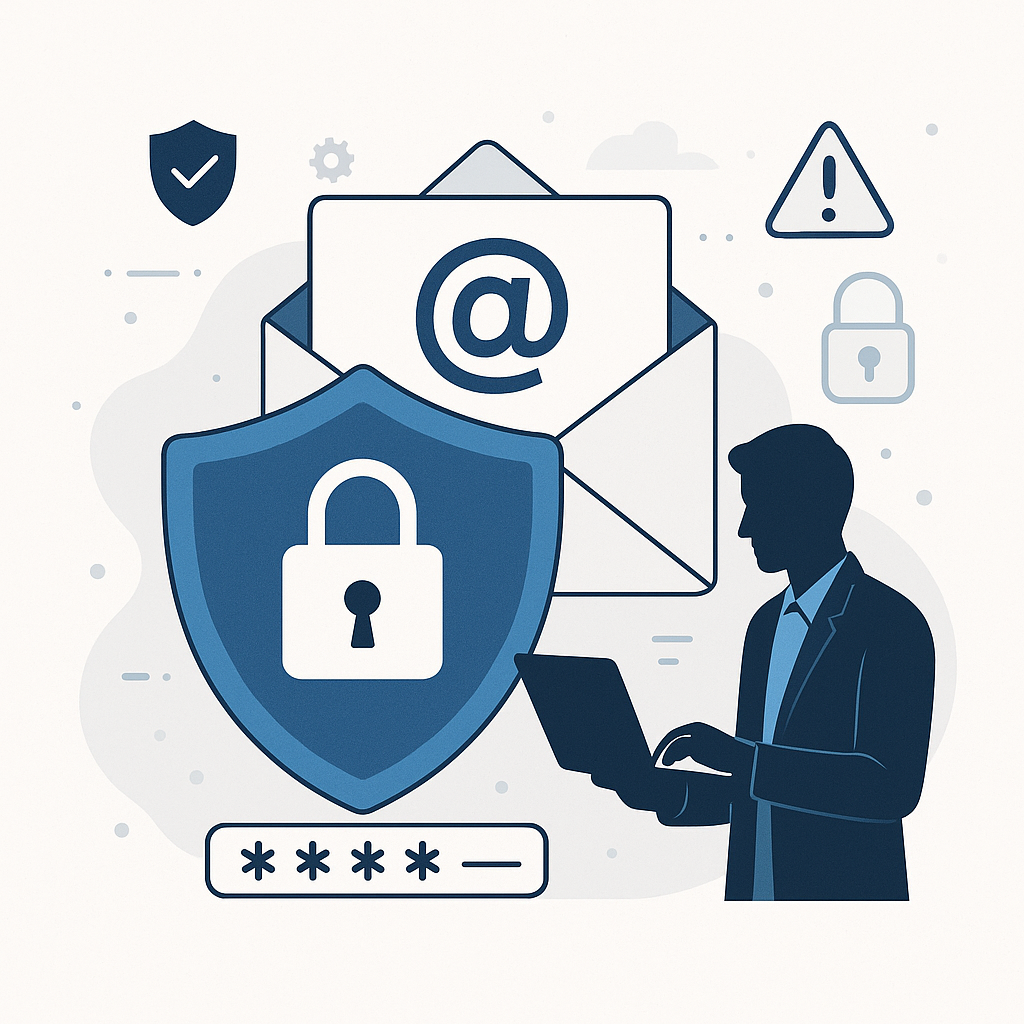AI Email Security Services: Protecting Your Productivity

In today's fast-paced digital landscape, email remains the backbone of business communication. From critical client interactions to internal team collaborations, our inboxes are central to daily operations. However, as organizations increasingly leverage AI-powered email platforms – tools designed to boost efficiency, automate tasks, and provide an ai executive assistant experience – the very nature of email security has undergone a dramatic transformation. The promise of unparalleled productivity comes with a significant caveat: the escalating sophistication of cyber threats. For busy executives, entrepreneurs, sales professionals, remote workers, and enterprise IT teams, the dual challenge of maximizing output while ensuring uncompromised data security is a constant tightrope walk. This article will delve into why robust AI email security services are not just an option, but a critical imperative for protecting your productivity and your peace of mind.
The Evolution of Email Threats: Why AI-Powered Platforms Need Next-Gen Security
Gone are the days when simple spam filters and basic antivirus software were sufficient to safeguard your email. Cybercriminals have evolved, adopting highly sophisticated tactics that leverage social engineering, advanced malware, and even AI themselves to bypass traditional defenses. The sheer volume of threats is staggering; a recent report indicated that phishing attacks, a primary vector for breaches, continue to rise, with businesses facing an average of 4.8 phishing attacks per month.From Spam to Spear Phishing: A Growing Threat Landscape
The journey of email threats has moved far beyond unsolicited advertisements. We now contend with:- Phishing and Spear Phishing: Highly targeted attacks designed to trick individuals into revealing sensitive information or clicking malicious links. These often mimic legitimate sources, making them incredibly difficult to detect without advanced tools.
- Business Email Compromise (BEC): A particularly insidious form of phishing where attackers impersonate a high-ranking executive or trusted vendor to deceive employees into transferring funds or sensitive data. BEC attacks often lead to significant financial losses.
- Ransomware: Malware delivered via email that encrypts a victim's files, demanding a ransom for their release. The downtime and data loss associated with ransomware attacks can be catastrophic for businesses.
- Malware and Zero-Day Exploits: Emails carrying malicious attachments or links that exploit previously unknown software vulnerabilities.
- Data Exfiltration: Attempts to steal sensitive company data, intellectual property, or customer information through compromised email accounts.
The AI Paradox: Boosting Productivity, Expanding Attack Surface
The integration of AI into email platforms, while revolutionary for productivity, simultaneously expands the attack surface. AI tools, designed to analyze, categorize, and even draft emails, process vast amounts of sensitive data. If compromised, these systems could provide attackers with unprecedented access to communications, contacts, and confidential information. Traditional email security falls short because it often relies on known signatures or simple rule-based detection. Modern threats, especially those crafted to mimic legitimate communication, require a more dynamic and intelligent defense. This is where advanced AI-powered email security solutions come into play, analyzing various aspects of incoming emails, including content, sender behavior, and contextual information.Bridging Productivity and Protection: The Core of AI Email Security Services
The core challenge for businesses today is not choosing between productivity and protection, but rather achieving both simultaneously. AI email security services are designed to be the bridge, creating a symbiotic relationship where security enhances, rather than hinders, efficiency.Security as an Enabler, Not a Barrier
For busy professionals, security measures can sometimes feel like roadblocks – extra steps, complex procedures, and constant alerts. However, the right private email providers and security services transform this perception. By proactively stopping threats before they reach the inbox, these services:- Reduce Distractions: Fewer suspicious emails mean less time spent sifting through junk or verifying legitimacy, allowing employees to focus on core tasks.
- Prevent Downtime: Avoiding a successful ransomware attack or data breach means uninterrupted operations, safeguarding productivity from catastrophic disruptions.
- Build Trust in AI Workflows: When employees trust that their AI-powered tools are secure, they are more likely to adopt and leverage them fully, maximizing their benefits. This fosters confidence in platforms like an automated assistant that manages your inbox.
Key Features to Look For in Email Security for AI Environments
When evaluating cloud email security services for your AI-powered platform, it's crucial to look beyond basic anti-spam. The following features are essential for comprehensive hosting business email security in an AI-driven world:Advanced Threat Detection and Prevention
This is the cornerstone of modern AI email protection.- AI/ML-Powered Phishing and BEC Protection: Solutions that use machine learning to analyze email patterns, sender behavior, and content to detect sophisticated phishing, spear phishing, and BEC attempts in real-time. This includes identifying anomalies that human eyes might miss. According to Abnormal Security, advanced behavioral AI can block socially-engineered attacks and other malicious emails, preventing significant financial losses.
- Ransomware and Malware Defense: Advanced sandboxing, deep content inspection, and behavioral analysis to detect and neutralize malicious attachments and links before they can execute.
- Zero-Day Exploit Prevention: The ability to identify and block threats that haven't been seen before, based on their behavior rather than known signatures.
- Impersonation Detection: Specific capabilities to spot emails attempting to impersonate executives, vendors, or other trusted entities, crucial for thwarting BEC attacks.
Data Privacy and Compliance
Ensuring email data privacy and adherence to regulatory standards is non-negotiable.- Data Loss Prevention (DLP): Tools that prevent sensitive information (e.g., credit card numbers, social security numbers, proprietary data) from leaving the organization via email, whether accidentally or maliciously.
- Email Encryption: End-to-end encryption for sensitive communications, ensuring that only authorized recipients can read the content.
- Compliance Archiving and E-discovery: Secure, immutable archiving of emails for regulatory compliance (e.g., GDPR, HIPAA, CCPA) and legal hold purposes, streamlining e-discovery processes.
Real-time Protection and Incident Response
Speed is of the essence in cybersecurity.- Real-time Threat Intelligence: Continuous updates from global threat intelligence networks to protect against the latest attacks.
- Automated Incident Response: Capabilities to automatically quarantine malicious emails, revoke access to compromised accounts, and alert security teams, minimizing the impact of a breach.
- Forensic Analysis: Tools to investigate security incidents, understand their scope, and identify root causes for future prevention.
Seamless Integration and User Experience
The best security is often invisible.- Compatibility with AI Email Platforms: The security service should integrate smoothly with your existing or planned AI email management systems, ensuring full protection without hindering AI functionalities.
- User-Friendly Interface: An intuitive dashboard for IT teams to manage policies, monitor threats, and generate reports.
- Minimal User Impact: Security measures should operate in the background, not interrupting user workflows or adding unnecessary friction.
User Training and Awareness Programs
Technology is only part of the solution; people are the first line of defense.- Phishing Simulations: Regular simulated phishing attacks to educate employees on how to identify and report suspicious emails.
- Security Awareness Training: Ongoing education on cybersecurity best practices, data handling, and company policies.
How Robust Email Security Enhances Business Productivity
The direct link between robust business email security and enhanced productivity is often underestimated. It's not merely about preventing losses; it's about optimizing workflows and fostering a secure environment where innovation can flourish.Reducing Distractions and Downtime
Imagine an average workday without the constant barrage of phishing attempts, spam, or the looming fear of a data breach.- Fewer Security Incidents: A strong defense dramatically reduces the number of security incidents that demand attention, freeing up IT resources and employee time.
- Uninterrupted Workflows: Preventing ransomware attacks or account compromises means no forced downtime, no data recovery efforts, and no lost productivity.
- Focused Employees: When employees aren't worried about clicking a malicious link or falling victim to a scam, they can focus entirely on their tasks, leading to higher quality work and greater output.
Fostering Trust in AI-Driven Workflows
The adoption of AI productivity tools, from smart inboxes to an AI for email productivity, hinges on user trust.- Confidence in Automation: When users know that their AI-powered email management system is protected by top-tier security, they are more likely to entrust it with sensitive tasks and communications. This is crucial for leveraging the full potential of an AI automation platform.
- Secure Data Handling: Knowing that sensitive data processed by AI tools is encrypted and protected against breaches builds confidence in using these innovative solutions for critical business functions.
Streamlining Operations and Saving Resources
Effective security is an investment that yields significant returns.- Reduced Remediation Costs: Preventing a breach is far less expensive than recovering from one, saving millions in potential fines, legal fees, and reputational damage.
- Optimized IT Resources: Automated security solutions reduce the manual burden on IT teams, allowing them to focus on strategic initiatives rather than constant threat response.
- Enhanced Reputation: Demonstrating a commitment to strong security builds trust with clients, partners, and stakeholders, potentially opening new business opportunities.
Selecting the Right Email Security Partner for Your AI Platform
Choosing the right ai executive assistant and accompanying security services requires careful consideration. It's not just about features; it's about partnership, scalability, and alignment with your business needs.Assessing Your Specific Needs
Before you begin your search, understand your organization's unique requirements:- Industry Compliance: Do you operate in a regulated industry (e.g., healthcare, finance) that requires specific security and data handling protocols?
- Current Infrastructure: What email platform are you currently using? How will the new security service integrate with it and your AI tools?
- Threat Profile: What are the most common threats your organization faces? (e.g., phishing, BEC, insider threats).
- Budget: What resources are you prepared to allocate for advanced email security?
Key Vendor Evaluation Criteria
When evaluating potential secure email platforms and security providers, consider the following:- Proven Track Record: Look for providers with extensive experience and a strong reputation in the cybersecurity industry.
- Advanced AI/ML Capabilities: Ensure their solutions leverage cutting-edge AI and machine learning for superior threat detection, particularly for sophisticated attacks.
- Scalability: Can the service grow with your business? Can it handle increasing email volumes and user counts without performance degradation?
- Integration Capabilities: Verify seamless integration with your existing email infrastructure (e.g., Microsoft 365, Google Workspace) and any AI productivity tools you use, such as an agentic AI for email.
- Customer Support: Assess the quality and responsiveness of their technical support. 24/7 support is often essential for critical business operations.
- Reporting and Analytics: Comprehensive dashboards and detailed reports are vital for understanding your security posture and demonstrating ROI.
- User Training and Awareness Offerings: Does the vendor offer or integrate with solutions for ongoing employee education?
Implementing and Maintaining Top-Tier Email Security for AI Success
Implementing robust AI productivity tools security is an ongoing process, not a one-time deployment. Successful integration and maintenance are key to long-term protection and productivity gains.A Phased Implementation Approach
Consider rolling out new security services in phases to minimize disruption:- Pilot Program: Start with a small group of users to test the solution, gather feedback, and identify any integration challenges.
- Gradual Rollout: Expand the deployment to departments or teams, ensuring smooth transition and addressing issues as they arise.
- Full Deployment: Once confident, roll out the solution across the entire organization.
Continuous Monitoring and Updates
The threat landscape is constantly evolving, so your defenses must too.- Regular Security Audits: Periodically review your email security posture, identify vulnerabilities, and ensure compliance.
- Threat Intelligence Integration: Ensure your security solutions are continuously updated with the latest threat intelligence to protect against emerging attacks.
- Policy Review: Regularly review and update your email security policies to reflect new threats, technologies, and business needs.
Employee Education and Empowerment
Your employees are your strongest defense, or your weakest link.- Ongoing Training: Conduct regular, engaging security awareness training sessions, focusing on current threats like sophisticated phishing and BEC.
- Phishing Simulations: Periodically test your employees' vigilance with simulated phishing attacks and provide immediate feedback and training.
- Foster a Security-First Culture: Encourage employees to report suspicious emails without fear of reprimand, creating a proactive security culture.
- Leverage AI for Training: Consider how Gmail AI features or similar intelligent assistants can help flag suspicious emails for users, acting as an additional layer of awareness.
The Future of Secure AI Email: What's Next for Businesses
The convergence of AI and email will only deepen, making the role of advanced secure AI email management more critical than ever. As AI systems become more sophisticated in managing our communications, so too will the tactics of cybercriminals.Emerging Threats and Proactive Defenses
We can expect to see:- AI-Generated Phishing: Attackers using AI to create highly personalized, grammatically perfect, and contextually relevant phishing emails that are even harder to detect.
- Deepfake Voice and Video BEC: Impersonations becoming even more convincing with AI-generated audio and video used in conjunction with email.
- Attacks on AI Models: Attempts to poison or manipulate the AI models themselves, leading to misclassifications or compromised data.
The Synergy of AI for Productivity and AI for Security
Ultimately, the future lies in a powerful synergy: AI-powered tools that enhance our productivity, seamlessly integrated with AI-powered security solutions that protect us. This holistic approach ensures that businesses can fully embrace the benefits of innovation without compromising their digital integrity. By prioritizing cutting-edge email security services, organizations can build a resilient foundation that not only defends against threats but actively enables growth and efficiency in the AI era. The time to act is now. Don't wait for a breach to realize the importance of robust email security. Invest in advanced solutions that protect your data, secure your infrastructure, and empower your team to leverage the full potential of AI-driven productivity, safely and with confidence.


Frequently Asked Questions
AI Email Security Services are advanced cybersecurity solutions that leverage Artificial Intelligence (AI) and Machine Learning (ML) to protect an organization's email infrastructure from a wide array of sophisticated threats. Unlike traditional email security solutions that primarily rely on signature-based detection, blacklists, and predefined rules to identify known threats, AI-powered services analyze patterns, behaviors, and anomalies in real-time. This allows them to detect evolving and previously unknown threats, such as zero-day attacks, highly personalized phishing, and Business Email Compromise (BEC) schemes, which often bypass conventional defenses. They continuously learn from new data, adapting their defenses to stay ahead of cybercriminals.
AI Email Security Services significantly enhance productivity by minimizing disruptions and safeguarding critical business operations. By proactively detecting and neutralizing sophisticated threats like phishing, malware, and spam before they reach inboxes, these services reduce the time employees spend identifying, reporting, or falling victim to malicious emails. This means less time wasted on cybersecurity incidents, fewer system downtimes due to breaches, and more focus on core business tasks. Furthermore, by reducing false positives, AI ensures legitimate communications are delivered promptly, maintaining seamless workflows and preventing unnecessary security investigations that can drain resources.
AI Email Security Services are designed to combat a comprehensive range of modern email threats that often evade traditional defenses. These include, but are not limited to: highly sophisticated phishing and spear-phishing attacks (including credential theft and whaling), Business Email Compromise (BEC) scams, ransomware delivery, advanced malware and zero-day exploits, spoofing and impersonation attempts, and sophisticated spam campaigns. AI's ability to analyze context, sender behavior, and even the nuances of language allows it to identify subtle indicators of malicious intent that human eyes or static rules might miss, offering robust protection against the most cunning cyberattacks.
Yes, a primary advantage of AI Email Security Services is their ability to significantly reduce false positives – legitimate emails incorrectly flagged as malicious. Traditional systems, relying on rigid rules, often err on the side of caution, leading to important emails being quarantined. AI and Machine Learning models, however, learn from vast datasets of both legitimate and malicious emails. They can understand context, sender reputation, communication patterns, and content nuances, allowing for more accurate threat differentiation. This leads to fewer legitimate emails being blocked, ensuring critical business communications flow unimpeded, which directly contributes to operational efficiency and trust in the email system.
Modern AI Email Security Services are generally designed for ease of implementation and management, even for businesses without dedicated cybersecurity teams. Many solutions offer cloud-native deployment, requiring minimal on-premise infrastructure. Integration with existing email platforms (like Microsoft 365 or Google Workspace) is often streamlined, often through API connections or simple MX record changes. Management interfaces are typically intuitive, providing dashboards for threat visibility, policy configuration, and reporting. While the underlying AI technology is complex, the user experience is focused on simplicity, allowing businesses to leverage advanced protection without significant operational overhead.
When selecting AI Email Security Services, consider several key factors. Look for comprehensive threat detection capabilities, including advanced phishing, BEC, and zero-day malware protection. Evaluate the solution's integration capabilities with your existing email platform and other security tools. Usability and ease of management are crucial, ensuring your team can effectively utilize the service. Scalability is important for growing businesses, and vendor reputation, support quality, and transparent reporting features should also be assessed. Finally, consider the AI's specific capabilities, such as natural language processing (NLP) for BEC detection, behavioral analytics, and continuous learning mechanisms to ensure adaptive protection against evolving threats.
Absolutely. While larger enterprises often face more targeted and sophisticated attacks, small and medium-sized businesses (SMBs) are equally vulnerable and often lack the resources to recover from a breach. AI Email Security Services offer scalable solutions that cater to varying business sizes and budgets. Many providers offer tiered plans, allowing SMBs to access enterprise-grade protection tailored to their specific needs without overwhelming complexity or cost. The automated nature of AI solutions is particularly beneficial for SMBs, as it provides robust protection with minimal manual intervention, freeing up limited IT resources to focus on other critical areas.
